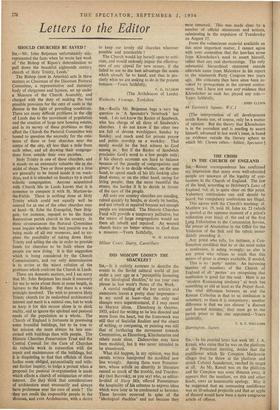Letters to the Editor
SHOULD CHURCHES BE SAVED ?
SIR,—Mr. John Betjeman unfortunately mis- represented the facts when he wrote last week of 'the Bishop of Ripon's determination• to pull down the beautiful eighteenth century church of Holy Trinity, Leeds.'
The Bishop (now in America) acts in these matters as Chairman of the Diocesan Pastoral Committee, a -representative and statutory body of clergymen and laymen, set up under a Measure of the Church Assembly, and charged with the duty of making the best possible provision for the cure of souls in the diocese in the light of prevailing conditions. There are many difficult problems in the city of Leeds duo to the movement of population and the creation of large new housing estates, and in its survey of these problems as they affect the Church the Pastoral Committee was bound to question the necessity for the exis- tence of three or four churches near the centre of the city, all less than a mile from each other, and all drawing their congrega- tions from outside their own parishes.
Holy Trinity is one of these churches, and it stands on an extremely valuable site in the midst of shops. Two or three people at a time are generally to be found inside it on week- days, and it is attended on Sundays by a small eclectic congregation. Anyone acquainted with Church life in Leeds knows that it is nonsense to compare it with St. Martins-in- the-Fields. There is nothing done at Holy Trinity which could not equally well be catered for at one of the other churches near at hand—St. John the Evangelist, New Brig- gate, for instance, reputed to be the finest Restoration parish church in the country. In these circumstances the Pastoral Committee must inquire whether the best possible use is being made of all our resources, and to ex- plore the possibility of taking down Holy Trinity and selling the site in order to provide funds for churches to be built where the people are now living. It is this suggestion which is being considered by the Church Commissioners, and our only determination is to arrive at the wisest solution of the problems which confront the Church in Leeds.
These are domestic matters, and I am sorry that Mr. John Betjeman has made it necessary for me to write about them at some length, in fairness to the Bishop. But there is a wider principle involved. The wish to preserve Holy Trinity church for its undoubted architectural interest and merit is a natural one, but to wish to keep it for this reason alone is to shirk reality, and to ignore the spiritual and pastoral needs of the population as a whole. The Church of England is fortunate in possessing some beautiful buildings, but to be true to her mission she must always be less con- cerned with buildings than with people. The Historic Churches Preservation Trust and the Central Council for the Care of Churches do valuable work in connection with the repair and maintenance of the buildings, but it is disquieting to find that officials of these bodies seem obliged, automatically and with- out further inquiry, to lodge a protest when a proposal for pastoral re-organisation is made which affects a church of antiquarian or other interest. Do they think that considerations of architecture must necessarily and always have preference over the cure of souls ? Do they not credit the responsible people in the dioceses, and even Archdeacons, with a desire
to keep our lovely old churches wherever possible and practicable ?
The Church would lay herself open to criti- cism, and would seriously impair the effective- ness of any appeal for new money, if she failed to use to the. best advantage the assets which already lie to hand, and that is pre- cisely what we are seeking to do in the present instance.—Yours faithfully,
C. 0. ELLISON
(The Archdeacon of Leeds).
Wetherby Vicarage, Yorkshire


































 Previous page
Previous page